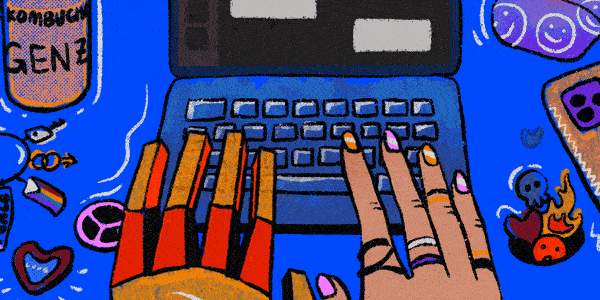Debunking myths: How Generation Z uses AI for work

This article is part of WorkLife’s special edition, which examines how the jobs and careers of Generation Z professionals will be reshaped and evolve in the AI-informed era. More from the series →
Generative-AI whiplash is fast becoming a standard response to the dizzying speed at which the technology is evolving.
Its capabilities and flaws are puzzling leaders at schools and universities as many try to ban or regulate its use among students. Meanwhile companies are either embracing the tools and creating their own proprietary large language models (LLMs), or still evaluating how to best incorporate AI into their operations.
One cohort in particular is keen to experiment and learn exactly what these tools are capable of: Generation Z. Born between 1997 and 2012, this digital-first generation is open to harnessing the tools that will reshape how they perform their jobs over the course of their careers.
Their openness however is stirring up an array of misconceptions. Here are some key myths about Gen Z workers and their use of generative AI in school, the workplace and their personal lives.
Myth: Gen Z workers are experts in AI and won’t need training
Gen Z workers are arguably more comfortable with the introduction of transformative new technology than those in other generations who grew up without advancements like smartphones and the internet. But that doesn’t mean Gen Zers know exactly how AI works. Many have interacted with predictive AI tools by way of personalized music and video recommendations, though their experience with newer generative AI tools is limited.
“It’s the start of a whole new era, a whole new ecosystem, and you cannot upfront be proficient with it,” said Alexey Korotich, vp of product at Wrike, a collaborative work management platform. “Additional skills are going to be required and people do not get those skills at birth,” he added.
Prompt engineering — the skill of knowing exactly what to put in ChatGPT and other generative AI tools to elicit the best, desired output which doesn’t sound generic — is seeing growing demand from employers, though it takes a decent amount of practice and time using the tools to truly understand and master. “Becoming AI experts will require extensive training,” said Jay Shankar, vp of global talent acquisition at Amazon Web Services.
Not only will Gen Zers need extensive training to master AI tools but they’ll also need to be taught in a way that’s tailored to them specifically and considers their unique experiences with technology. “Even though it may seem easy to use generative AI tools by entering a prompt and then getting a response, generative AI is a very sophisticated and complex technology,” Shankar said.
Best practices when it comes to prompt engineering — but even more so when it comes to responsible and ethical use of the tools — are paramount for Gen Z employees to fully grasp.
“You need to understand the limitations of this technology, and you need to understand where it is helpful to use it, versus going to be actually misleading or harmful,” Korotich said.
Harmful outputs are most often those that are inaccurate or biased – two key flaws with today’s AI tools.
Myth: Gen Z workers aren’t reckless with AI
While Gen Z workers are more willing and eager to experiment with AI and learn exactly how it works, they still haven’t had enough professional experience to understand the implications of using it in a work setting.
One major generational difference already posing a problem when it comes to AI is differing attitudes toward sharing information online or through other public channels. Younger workers who grew up with social media and few protections around their online privacy are accustomed to accepting cookies and typing in their birthdates to enter a web page — much unlike those in Generation X, or Baby Boomers.
They’re equally open to sharing information with LLMs like ChatGPT — including private company information.
“We have worked with many organizations where people have taken Excel spreadsheets, uploaded them to public ChatGPT to get something done, and have exposed companies’ data in that manner,” said Jason Averbook, a senior partner and global leader of digital HR strategy at consulting firm Mercer. “And almost always, it’s been Gen Zs that have been there and done that,” Averbook added.
Their limited professional experience means they also have limited knowledge around safeguarding enterprise data, he said. “Gen Z needs to understand the ethics and governance that goes into generative AI in organizations before they just start using it the same way they would use it when they’re writing their thesis paper or things like that,” he said.
Myth: AI will make Gen Z workers lazy
A major myth about generative AI is that it encourages laziness, and in schools, that it’s a form of cheating. And laziness is an attribute Gen Z often gets labeled with (headlines range from it being a generation of quiet quitters, to fans of “Lazy Girl” jobs and bare minimum Mondays).
But when it comes to AI, so-called laziness may result in higher efficiency. “Laziness is not necessarily a bad thing — it actually provokes the search for the tools that can do your job more effectively,” Korotich said.
The prevailing theme from experts is that AI will take over more mundane tasks and allow workers to perform more satisfying, engaging and higher-level work. AI tools currently are also helpful as a copilot or mentor for younger workers looking for a sounding board or expert to answer questions through tools like ChatGPT.
“AI is not meant to do the work for you, but it’s there to help you save a ton of time on various tasks,” said Oliver Pour, an account executive at Luminance, an AI software for those in the legal field.
And a human teamed up with AI can do much more than a human on their own. “This is not a new idea, a human plus the internet could do a lot more than just a human without the internet,” said Graham Glass, founder and CEO of Cypher Learning, an AI-powered platform designed to help educators generate curriculum and learning materials.
Accordingly, the way we perform most jobs will change as the assumption they’re being done with AI becomes more commonplace. “If you’re in a good work environment, they’re not going to allow you to be lazy because they’re going to expect more,” said Glass.
Myth: AI will replace Gen Z workers
Gen Z isn’t the first generation expected to be replaced by new technology. Jobs have been made obsolete by technological innovation for more than a century. The introduction of computers led many to fear their jobs would become defunct. But computers, the internet, email, and other innovations “were built to improve our productivity, and generative AI has the potential to follow suit,” Shankar said.
Accordingly, AI is expected to widely augment the way everyone does their jobs in the future.
Many of the jobs that generative AI assists with are administrative. As such, tasks that would typically always have been assigned to a junior in a desk-based workplace, are now at risk of being carried out within minutes, rather than days, by AI tools as older workers realize they can get faster results this way. But that doesn’t mean Gen Z workers will be replaced, simply that their roles will evolve.
Plus, all jobs are at risk of generative-AI driven change, not just Gen Z’s, according to an Indeed analysis of skills listed in over 55 million job postings. About 20% of jobs face high levels of potential exposure, and the higher the odds are that a job can be done remotely, the greater its potential exposure is, that report found.
“Some jobs are not necessarily going to be replaced, they’re going to be augmented, they’re going to be adapted to these new technologies so that people will continue to do the job but focus on the things where they can drive value,” Korotich said.
“It can be a threat in a way that it can replace what you do today,” Korotich said. “But it can also be a huge opportunity that can truly get your productivity, and your level of impact that you, as an individual bring, to the next level,” he said.



